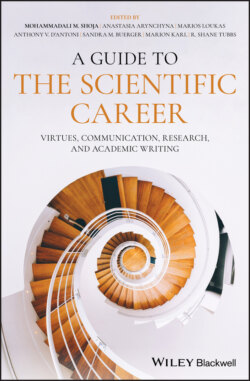Читать книгу A Guide to the Scientific Career - Группа авторов - Страница 55
5.1 Introduction
ОглавлениеMost students, graduates, and professionals are aware that confidence contributes to their success. Therein lies the question, “What is confidence?” Confidence describes the beliefs you hold about your potential to achieve an outcome. Confidence differs from self‐efficacy by referring to a broader belief in the sum of your abilities rather than referring to a specific domain or task. Self‐efficacy, on the other hand, is task specific and refers to your belief in your ability to succeed in specific situations (Bandura 1986). Confidence contributes to the decisions made in your life, goals, and career; the approach taken to achieve those goals or career; and how you adjust and adapt to obstacles.
Confidence may not be equally represented in all aspects of one's life. In your personal life, confidence may present as how much you believe in yourself, also known as self‐confidence; decisions you make regarding everyday life; the people you surround yourself with; and how you develop your self‐image. In academic and medical settings, confidence may refer to your interactions with patients, the relationship between your knowledge and experiences, the quantity or number of papers or books published, the number of grants or presentations, and/or the recognition that you receive from peers. This means that personal confidence may not translate into your career or that your confidence in an academic or medical setting may not make you more confident in your home life. The key to understanding confidence lies in understanding what confidence means to you.
Confidence is expressed by self‐awareness, knowing your strengths and weaknesses, prior and current successes, trusting your capabilities, embracing the unknown, taking risks, learning to receive praise or criticism, and practicing tenacity. Amy Lee Tempest once stated about confidence, “I feel it is something that is always there, something you are born with that gets lost along the way, or stolen by others. Sometimes you have to dig deep to find it again” (cited by Deschene 2014). Forming doubts and insecurities and heavily focusing on how others perceive you may cause you to avoid constructive criticism and lower your self‐confidence. When this happens, remembering that you were born with confidence, and the ability to use it to your advantage can attenuate the thoughts that threaten it. As you develop your self‐image, you can begin to gain confidence in your strengths and learn from your weaknesses. Making an effort to understand and accept the weaknesses and transform them into strengths can boost confidence, bringing a sense of success and fulfillment.
Confidence comes from success… But confidence also combines another quality because you can be successful, yet lack confidence. It requires a mental attitude shift to an expectation of success. And this alone, can bring about more success, reinforcing the confidence. It spirals from there.
– Jason Hihn (cited by Rose 2017)
In trusting your capabilities to overcome challenges and obstacles, you can conquer more than you may expect. Confidence stems from the willingness and capacity to learn and not from the security of knowing what you can and cannot do. Constructive criticism becomes an opportunity for you to learn from experiences. Confidence comes from a space of humility, growing when you embrace new and challenging experiences. It is not knowing that you can create the outcome you desire, but understanding your competence and acknowledging that the undesirable outcomes that may happen may have nothing to do with you or what you should have done. This allows you to feel more confident in what you may have to offer. This is very similar to accepting that confidence only matures from taking risks and understanding the associated changes.
Confidence is a funny thing. You go out and do the thing you are most terrified of, and the confidence comes afterwards.
– Christopher Kaminski (cited by Deschene 2014)
By practicing certain tasks and exercises, you can both improve your tenacity skills and build your confidence in all aspects of life. For example, if you feel inadequate in your professional endeavors but are extremely confident in your personal relationships, by remembering how you feel and how comfortable you are in your personal life you can emit similar confidence into your professional career by drawing from other areas of confidence. The confidence gained from the aforementioned scenario is then cemented by positive recognition and reinforcement. You can trust in yourself, your skills, and your abilities when you believe in yourself and recognize that others believe in you as well.
